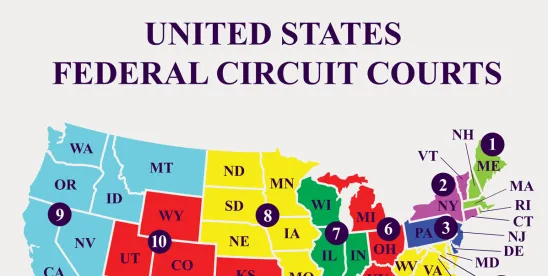A key purpose of multidistrict litigation (MDL) is centralized management of pretrial proceedings to avoid duplicative discovery and resolve common issues in an efficient manner. An MDL court becomes sufficiently familiar with the facts, scientific issues, and procedural history of the litigation to often allow a just and efficient resolution of complex discovery disputes.
One type of dispute common in MDL proceedings concerns third-party discovery. Often, third parties are essential sources of critical information about a claim—such as physicians who treated a plaintiff in product liability litigation. Just as frequently, these third parties are located outside the district of the MDL judge, forcing parties to serve extra-district subpoenas to obtain such discovery.
When disagreements arise over the scope or content of a subpoena, Rule 45 of the Federal Rules of Civil Procedure requires such disputes to be brought in the “district court where compliance is required,” which is rarely the MDL court. Those situations raise the question whether the MDL court can exercise jurisdiction over subpoena-related disputes despite the mandate of Rule 45. This article analyzes the apparent conflict between Section 1407’s authorization of MDL courts to resolve pretrial disputes and Rule 45’s subpoena requirements, and how courts have resolved this conflict for MDL litigants.
-
The Conflict Between the MDL Court’s Authority to Manage Pretrial Proceedings and Rule 45’s “Where Compliance Is Required” Requirement.
At the heart of the dispute over where parties should bring subpoena-related motions in MDL proceedings is the conflict between Rule 45 and Section 1407. In ordinary cases, Rule 45(d) provides that a party must move to enforce or quash a subpoena in “the district where compliance is required”—typically, the district where the individual or entity resides. But in enacting Section 1407, Congress centralized management of pretrial proceedings in a single federal court to ensure the “just and efficient” conduct of the litigation.[1] Indeed, a key role of multidistrict consolidation is to “avoid duplicative discovery, prevent inconsistent pretrial rulings and conserve judicial resources.”[2]
To further these goals, Section 1407 also provides MDL courts with the authority to “exercise the powers of a district judge in any district for the purpose of conducting pretrial depositions.”[3] Thus, whether this statutory language authorizes MDL courts to manage subpoena disputes involving extra-district nonparties requires courts to confront the “apparent conflict” between Rule 45 and Section 1407.[4]
-
Who Has Jurisdiction Over Extra-District Nonparty Subpoenas?
-
Leading Decisions Hold that MDL Courts Have Broad Authority to Enforce Extra-District Subpoenas Under Section 1407
The two leading decisions analyzing the conflict between Section 1407 and Rule 45 arose out of a multidistrict qui tam action consolidated in the District Court for the District of Columbia in U.S. ex rel. Pogue v. Diabetes Treatment Centers of America, Inc. In Pogue, the relator served subpoenas duces tecum on nonparty businesses headquartered in Tennessee.[5] After the parties failed to resolve disagreements over the scope of the subpoenas, the relator sought to enforce them in the MDL district court. The nonparties opposed enforcement there, contending that under Rule 45, the subpoenas could only be enforced “where compliance is required”—in that case, the Middle District of Tennessee.[6]
The MDL court noted that “[w]ere this an ordinary case, [the nonparties] would be correct and this case would be easily disposed of” given Rule 45.[7] But it observed that this was “not an ordinary case” because the Judicial Panel on Multidistrict Litigation had “transferred to this Court related qui tam actions pending across the country under the authority of 28 U.S.C. § 1407.”[8] The court explained that the purpose of MDL actions is to ensure the “just and efficient” conduct of pretrial proceedings involving common issues and “to eliminate duplicative discovery, pretrial rulings, and conserve the resources of the parties, their counsel and the judiciary.”[9] It then held that “to that end, § 1407 bestows upon the transferee court the power to exercise the powers of a district judge in any district for the purpose of conducting pretrial depositions in MDL cases.”[10]
Although the MDL court found that while it was not “a settled question” whether it had jurisdiction over extra-district subpoenas, “the weight of authority and effectuation of the purposes of multidistrict litigation support a finding of jurisdiction,” and that “§ 1407 confers on MDL judges the power to supervise depositions taking place in other jurisdictions.”[11] The court also found that the use of the term “shall” in Section 1407(b) “mandates that such motions be heard by the MDL court.”[12] Thus, the court determined that it had jurisdiction over the relators’ motions to compel the extra-district nonparties to comply with the subpoenas.[13]
In a later appeal, the Sixth Circuit[14] agreed with the MDL court, observing that “the Federal Rules are designed to ensure that district courts remain firmly in control of those depositions and document productions involving nonparties located in their districts.”[15] Because the Federal Rules “could hamstring an MDL court’s ability to conduct coordinated pretrial proceedings over cases that have been consolidated from far-flung foreign districts, the MDL statute empowers an MDL judge to act as a judge of the deposition or discovery district.”[16] The court, therefore, held that “[a] judge presiding over an MDL case” could rule on subpoena-related motions “notwithstanding the nonparty’s physical situs in a foreign district where discovery is being conducted.”[17]
-
Courts Have Expressed Conflicting Views on Whether an MDL Court Can Enforce an Extra-District Subpoena Duces Tecum
As one court has observed, “[t]he overwhelming majority of courts that have considered the issue of whether Section 1407(b) authorizes a transferee judge the power to act as any judge of any district for pretrial depositions as well as subpoenas duces tecum, have found that it does.”[18] For example, the District Court for the District of Puerto Rico in In re San Juan Plaza Hotel Fire Litig. found that to effectuate the purpose of multidistrict litigation, it is “necessary to append to the transferee judge enforcement powers in relation to subpoenas issued in the deposition district, including depositions and subpoenas addressed to nonparties.”[19] Likewise, the District Court for the District of Kansas in In re EpiPen Mktg., Sales Practices and Antitrust Litig. observed that the “statute’s remedial purpose of eliminating the potential for conflicting contemporaneous pretrial rulings would be frustrated if the MDL court could not entertain motions to compel [compliance with subpoenas in other districts].”[20] Other courts have reached similar conclusions when presented with the conflict between Rule 45 extra-district subpoenas and Section 1407.[21]
A small minority of courts, however, has narrowly construed Section 1407(b) as authorizing an MDL court to enforce deposition subpoenas—but not document subpoenas. For example, in In re Packaged Seafood Prod. Antitrust Litig., the MDL court declined to exercise jurisdiction over enforcement of a subpoena duces tecum. The court acknowledged that Section 1407(b) authorized it to exercise the powers of a district judge in any district “for the purpose of conducting pretrial depositions,” and that “may necessarily include the power to enforce deposition subpoenas.”[22] But it drew a distinction between a deposition subpoena and a subpoena duces tecum—a distinction which it found “makes a difference.”[23] In refusing to enforce the subpoena duces tecum, the court reasoned that “[t]he extension of jurisdiction in MDL cases to the conduct of pretrial depositions” is not “tantamount to extending jurisdiction to enforce document subpoenas on third parties.”[24]
Other courts have also interpreted Section 1407 narrowly. In VISX, Inc. v. Nidek Co., et al., the District Court for the Northern District of California found that “§ 1407(b) expands a transferee court’s discovery powers only to pretrial depositions,” and that “[h]ad Congress wanted to expand these powers to document subpoenas, it would have said so.”[25] In In re Monat Hair Care Prod. Mktg., Sales Practices & Prod. Liab. Litig., the District Court for the Southern District of Florida found “the reasoning of In re Packaged Seafood and VISX persuasive” that “Section 1407(b) does not expressly exempt MDL courts from Rule 45’s dictates; rather, it expressly gives MDL courts the discretion to exercise the powers of a district judge in any district only for the purpose of conducting pretrial depositions.”[26] Thus, given that “Section 1407(b) makes no reference to subpoenas for the production of documents,” the court held that Rule 45 mandated that only the Middle District of Florida had jurisdiction to enforce the nonparty, nonresident subpoena.[27]
That said, courts holding that MDL courts lack jurisdiction over extra-district document subpoenas are in the minority. Indeed, the 6th Circuit in Pogue noted that while “[a]n argument can be made that the Section 1407(b)’s grant of authority to the MDL judge to oversee nonparty discovery occurring outside of the MDL district does not extend to enforcement of documents-only subpoenas,” the “rationale underlying the MDL statute of ‘just and efficient’ resolution of pretrial proceedings requires the conclusion that Section 1407(b)’s grant of authority applies to both deposition and document-only subpoenas.”[28] Most other courts that have considered the issue have similarly agreed that “[i]n keeping with the efficiency goals of the MDL statute,” an MDL court’s authority “extends to overseeing subpoenas for documents.”[29]
-
A Motion to Transfer to the MDL Is a Viable Alternative
If an opposing party has already moved under Rule 45(d) to quash or modify a subpoena in the “district where compliance is required,” or an MDL court declines to exercise jurisdiction over the initial subpoena-related motion, a Rule 45(f) transfer for “exceptional circumstances” to the MDL court can be appropriate. Although the term “exceptional circumstances” is not defined in Rule 45, the Advisory Committee Notes provide that while the “prime concern” when considering transfer “should be avoiding burdens on local nonparties subject to subpoenas,” in “some circumstances . . . transfer may be warranted in order to avoid disrupting the issuing court’s management of the underlying litigation[.]”[30] And courts have found “exceptional circumstances warranting transferring subpoena-related motions . . . when transferring the matter is in the interests of judicial economy and avoiding inconsistent results.”[31]
In re Disposable Contact Lens Antitrust Litig. provides an especially applicable analysis of Rule 45(f) and MDL subpoenas. Here, plaintiffs issued a subpoena duces tecum to a nonresident third party, which ultimately refused to comply with the subpoena.[32] Plaintiffs moved to enforce the subpoena in the MDL court, which found that it lacked authority to rule on the motion because, under Rule 45, “a party seeking to compel compliance with a subpoena must file its motion in ‘the district where compliance is required.’”[33] Following the MDL court’s ruling, plaintiffs filed an action in the District Court for the District of Columbia—where compliance was sought—to transfer the subpoena-enforcement motion to the MDL court under Rule 45(f) or, in the alternative, enforce the subpoena.[34] After engaging in an exacting analysis, the district court found that transfer of the motion to enforce the subpoena to the MDL proceeding was appropriate.
First, the court observed that the “MDL status of the underlying litigation is surely an ‘exceptional circumstance’ that weighs strongly in favor of transfer to the Issuing Court under Rule 45(f), because the same concerns about orderliness and disruption that led to the consolidation of actions as an MDL in the first place arise with respect to pretrial disputes regarding subpoenas issued in the context of that complex litigation.”[35] Second, the court noted that it was “highly unlikely” that the respondent would need to travel to the MDL court in Florida, as a telephonic hearing on the motion was likely, and thus there was no undue burden to the nonresident respondent.[36] And lastly, given the that the MDL was a “rather a highly complex case and potentially a class action asserting nationwide antitrust claims against five large corporate defendants,” the district court found that the MDL court was best situated to decide whether the subpoena should be enforced.[37] Thus, given that the “factors that weigh in favor of transferring this subpoena dispute” were abundant, the district court granted plaintiffs’ motion and transferred the motion to the MDL court.[38]
-
Conclusion
While the language of Rule 45 suggests that subpoena-related disputes can only be resolved in the “district where compliance is required,” MDL litigants should be aware of the authority granted to MDL courts under Section 1407. The MDL court is often better suited to resolve such disputes given its extensive knowledge of the facts and science surrounding the litigation and the history of the litigation. In the event that an MDL court declines to exercise direct jurisdiction over a dispute concerning a subpoena duces tecum, a Rule 45(f) transfer of a motion from the local district to the MDL court is a feasible alternative. With either approach, MDL litigants can better ensure that complex subpoena-related disputes are resolved by the MDL court in an efficient manner that reduces the potential for inconsistent rulings or duplicative discovery.
[1] In re New York City Mun. Sec. Litig., 572 F.2d 49, 51 (2d Cir. 1978) (quoting H.R. Rep. No. 1130, 90th Cong., 2d Sess.).
[2] In re Air Disaster, 486 F. Supp. 241, 243 (J.P.M.L. 1980).
[3] 28 U.S.C. § 1407(b).
[4] E.g., In re Mentor Corp. Obtape Transobturator Sling Prod. Liab. Litig., No. CIV.A. 09-3073JAP, 2009 WL 3681986, at *2 (D.N.J. Nov. 4, 2009); In re Subpoenas Served on Wilmer, Cutler & Pickering & Goodwin Proctor LLP, 255 F. Supp. 2d 1, 1 (D.D.C. 2003).
[5] 238 F. Supp. 2d. 270, 273 (D.D.C. 2002).
[6] Id.
[7] Id.
[8] Id.
[9] Id.
[10] Id. (citing 28 U.S.C. § 1407(b); Man. for Complex Litig. (Third) § 21.424 (2002)) (internal quotations omitted).
[11] Id. at 273-74 (citing In re Corrugated Container Antitrust Litig., 662 F.2d 875, 879 (D.C. Cir. 1981)).
[12] Id. at 275.
[13] Id. at 279.
[14] As noted in the 6th Circuit’s opinion, appeal from exercise of an MDL judge’s authority to act as a judge of the deposition or discovery district “lies in the circuit court embracing that deposition or discovery district.”
[15] U.S. ex rel. Pogue v. Diabetes Treatment Ctrs. of Am., Inc., 444 F.3d 462, 468 (6th Cir. 2006).
[16] Id. at 468.
[17] Id. at 468-69.
[18] In re: Intel Corp. Microprocessor Antitrust Litig., No. 05-1717-JJF, 2007 WL 9612142, at *3 (D. Del. May 18, 2007), report and recommendation adopted, No. 05-1717-JJF, 2007 WL 9612141 (D. Del. June 14, 2007); see also In re Mentor Corp. Obtape Transobturator Sling Prod. Liab. Litig., No. CIV.A. 09-3073JAP, 2009 WL 3681986, at *2 (D.N.J. Nov. 4, 2009) (finding that “most courts which have addressed this issue have concluded that section 1407(b) empowers an MDL transferee court to exercise the powers of any other district court, including the enforcement of subpoenas.”).
[19] 117 F.R.D. 30, 32 (D.P.R. 1987).
[20] 2018 WL 2926581, *3 (D. Kan. June 11, 2018).
[21] See, e.g., In re Am. Med. Sys., Inc. Pelvic Repair Sys. Prod. Liab. Litig., No. 2325, 2017 WL 1090029 (S.D.W. Va. Mar. 21, 2017); In re Neurontin Mktg., Sales Practices & Prod. Liab. Litig., 245 F.R.D. 55 (D. Mass. 2007); In re Accutane Prod. Liab. Litig., No. 804MD2523T30TBM, 2006 WL 1000311 (M.D. Fla. Apr. 14, 2006).
[22] No. 15-MD-2670-JLS-MDD, 2018 WL 454440, at *2 (S.D. Cal. Jan. 17, 2018) (citing 28 U.S.C. § 1407(b)).
[23] Id.
[24] Id.
[25] 208 F.R.D. 615, 616 (N.D. Cal. 2002).
[26] No. 18-MD-02841, 2020 WL 1950463, at *2 (S.D. Fla. Apr. 23, 2020).
[27] Id.
[28] U.S. ex rel. Pogue, 444 F.3d. at 468 n.2.
[29] In re Photochromic Lens Antitrust Litig., No. 8:10–md–2173–T–27, 2012 WL 12904391, at *2 (M.D. Fla. Dec. 20, 2012) (collecting cases); see also In re Bank of New York Mellon Corp. Forex Transactions Litig., No. 11 CIV. 9175 LAK JLC, 2014 WL 2884726, at *1 (S.D.N.Y. June 26, 2014) (“Despite [Section 1407(b)’s] limiting language as to depositions, however, it is widely accepted that this authority extends to all pretrial proceedings, including governance of non-party, extra-district subpoenas.”).
[30] Rule 45(f), 2013 Advisory Committee Note.
[31] Wultz v. Bank of China, Ltd., 304 F.R.D. 38, 46 (D.D.C. 2014); see also In re Braden, 344 F. Supp. 3d 83, 91 (D.D.C. 2018) (finding that transfer of subpoena-related motion to Southern District of Ohio “is appropriate to avoid disrupting the underlying litigation.”).
[32] 306 F. Supp. 3d 372, 374 (D.D.C. 2017).
[33] Id.
[34] Id.
[35] Id. at 378.
[36] Id. at 379-81.
[37] Id. at 381 (internal quotations omitted).
[38] Id. at 383.





 />i
/>i

